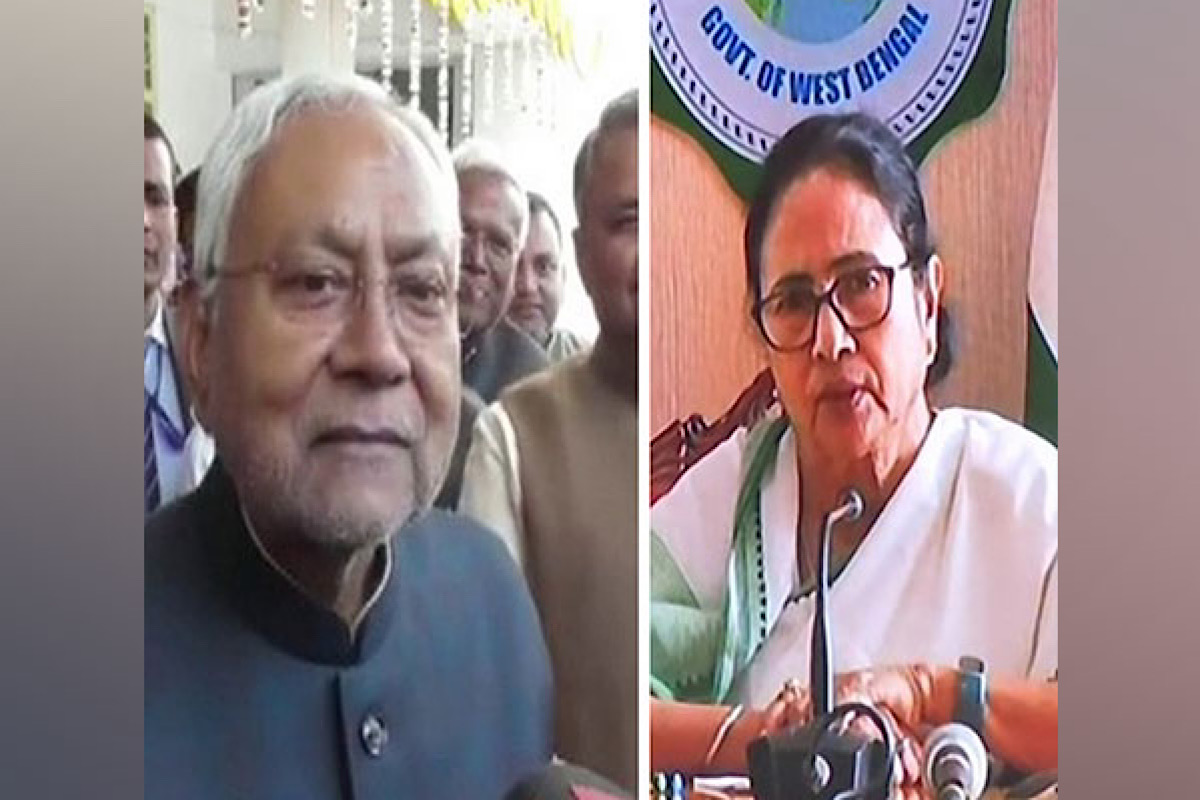BJP seeks ban on Kejriwal’s campaign over ‘poisoning’ Yamuna water allegation
The demand came in response to Kejriwal’s allegation that the BJP-led Haryana government was "poisoning" the Yamuna River's water supply to Delhi.

(From left) Nitish Kumar and Mamata Banerjee [Photo:ANI]
On June 23, a crucial meeting of prominent political figures from across India will be held in Patna, with the primary objective of devising a plan to oust the BJP government in the upcoming 2024 Parliamentary elections. The initiative was taken by Bihar Chief Minister Nitish Kumar, who recently met with West Bengal Chief Minister Mamata Banerjee in Kolkata to discuss the matter. It is anticipated that Mamata Banerjee will participate in the gathering.
The meeting and the prospect of a united front against the BJP have reignited speculations about Mamata Banerjee’s potential candidacy for the top position if the opposition alliance emerges victorious. The idea of Mamata as Prime Minister was first raised prior to the 2014 Parliamentary elections, with notable support coming from renowned writer and Magsaysay awardee, the late Mahasweta Devi.
Advertisement
However, the overwhelming victory of the BJP under Narendra Modi’s leadership dashed those hopes, although the concept has resurfaced with each subsequent general election. Notably, high-profile TMC MP and actor Shatrughan Sinha recently endorsed Mamata Banerjee as the only viable alternative to Modi, and economist and Nobel laureate Amartya Sen reportedly expressed that it could be a possibility.
Advertisement
Mamata Banerjee has always projected herself as a national leader, evident from the full name of her party, the All India Trinamool Congress (AITMC). Political analysts argue that Mamata’s credentials make her a suitable candidate. Tarun Ganguly, a Bengal political expert, acknowledges the possibility of Mamata Banerjee becoming Prime Minister, stating, “I cannot rule out the possibility that Mamata Banerjee can become the Prime Minister someday. More unlikely candidates have held the post before. Deve Gowda or IK Gujral were not national players before they found themselves leading the nation. Mamata can certainly stake a claim to the Prime Ministership; she has been a prominent member of the Congress, and she has founded her own party, which currently governs a state like West Bengal. She is visible and possesses charisma.”
However, skeptics argue that there are several other strong contenders. Professor Biswanath Chakraborty, a political analyst, points out that the meeting will be attended by at least half a dozen prominent leaders, including Rahul Gandhi from the Congress, Uddhav Thackeray from Shiv Sena, Sharad Pawar from NCP, and Arvind Kejriwal, the Chief Minister of Delhi, among others.
Supporters believe that the 2024 elections could be a game-changer, considering the changes in political equations over the past decade. With other potential contenders like the late Jayalalitha, former Chief Minister of Tamil Nadu, and Mayawati, former Chief Minister of Uttar Pradesh, no longer in the picture, Mamata’s chances of leading the opposition in the event of a united front are significantly greater.
According to Dola Sen, a close aide of Mamata Banerjee and Rajya Sabha MP of AITMC, no other politician is better suited to lead a possible opposition alliance than Mamata Banerjee. Sen emphatically asks, “With due respect, show me one other political leader with the kind of trajectory that Mamata Banerjee has?” Highlighting Mamata’s extensive experience as a politician for almost four decades, Sen explains, “Mamata Banerjee has been an MP seven times, serving as a minister five times (twice as Railways Minister, once as Coal Minister, and once as Youth Minister). She has been elected Chief Minister three consecutive times. Her party’s strength in the Assembly has risen significantly, from 186 seats in 2011 to 211 in 2016, and further to 217 in 2021.”
Regarding Mamata Banerjee’s status as a national leader, Sen states unequivocally, “Didi is a national leader.” Since her first victory as a Congress candidate against the formidable left leader late Somnath Chatterjee in the 1984 Parliamentary elections, Mamata has been active in national politics until she assumed the leadership of West Bengal in 2011. At one point, AITMC had MLAs in states like Goa, Manipur, Meghalaya, and UP. Presently, the party holds 10 MPs in the Meghalaya Assembly.
Nevertheless, doubts persist even within her own party. An AITMC MP, who preferred to remain anonymous, remarks, “Although Didi is undoubtedly one of the most qualified leaders, there is not enough national presence to project this idea.”
While the feasibility of the idea hinges on the formation of an opposition alliance, Sen clarifies that “Mamata Banerjee has no agenda of becoming Prime Minister. She has repeatedly stated this. Our sole national agenda is to topple the BJP government.”
Advertisement